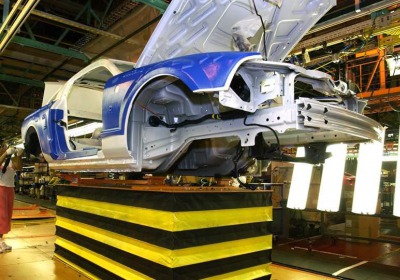Why this year's UAW-Detroit 3 talks don't matter
Thu, 08 Sep 2011
Here's what you need to know about the current UAW contract talks with the Detroit 3: They don't really matter.
Oh, sure, agreements must be reached and contracts signed. But some commentators would have you believe the Detroit 3's future competitiveness hinges on their ability to stand up to the UAW in this year's negotiations. Baloney.
Here are two reasons why the talks are somewhat important. And, trumping those two, the reason why the talks will not determine the competitiveness of General Motors, Chrysler Group or Ford Motor Co.
Important
First, the talks are symbolic, a litmus test. After the fresh start offered to GM and Chrysler by bankruptcy, are those two automakers going to backslide to the old business-as-usual mentality? In a recession that may not be over, are the automakers blithely going to accept higher costs?
(By the way, Ford CEO Alan Mulally's humongous pay and bonus may or may not have been out of line, but that's a dispute to be fought elsewhere, not at the UAW bargaining table. Offering a free-agent star pitcher a $42 million contract doesn't mean a professional baseball team has to give raises to the rest of the team.)
Everyone from investors to white-collar GM, Ford and Chrysler employees is watching. If the old entitlement attitudes prevail, that won't bode well for the so-called New GM or Chrysler or Ford.
Second, the talks matter deeply to those inside the UAW. But they matter differently to the rank and file and to the union's leaders.
Naturally, all UAW members want to know what their paychecks will look like. Whether they're hard-liners or not, they need to know the family budget. Who doesn't?
The leaders, though, are painfully aware that a shriveling membership base threatens the union's political clout -- and the leaders' paychecks. President Bob King is eager to prove this isn't your father's UAW, in hopes of adding workers at Asian and European automotive factories in the United States to the union's rolls.
Not important
The UAW talks don't matter because management is more important than labor.
For starters, white-collar costs trump blue-collar costs.
You can pretty much ignore all the comparisons of labor rates at UAW and nonunion plants. Labor costs just don't add up to that much. Manufacturing costs account for roughly 15 percent of a car or truck's costs. That includes labor, capital equipment and a bunch of other expenses.
I'm not saying that it doesn't matter if high labor rates, including health care costs, make a U.S.-built Ford Focus 5 percent more expensive than a U.S.-built Honda Civic.
But white-collar costs -- meaning both managers' compensation and how effectively an automaker manages its white-collar staff -- have a much greater impact on a car's price tag.
GM recently admitted that it has been throwing away about $1 billion a year -- year after year after year -- because of its poorly executed product-development programs. Some of that came from canceling programs when cash got tight, then restarting them later and having to repeat work it had already done.
GM and Chrysler also appear to have realized, finally, that beating up on suppliers to save a dime per part means those suppliers may be less inclined to bring their best new technologies to those automakers first. This is completely outside the UAW's influence, but it matters enormously. It's tough to be competitive if your rivals always have the most exciting new gizmos before you.
Or take speed to market. If a carmaker can't produce a derivative model -- say, a long-wheelbase version or a crossover built on an existing sedan's platform -- in 24 months or so, it is not competitive in today's global automotive marketplace.
The UAW has no influence over an automaker's speed to market. That's management's responsibility. It's all about organizing and managing the automaker's engineers well.
So take your eyes off the UAW talks, and look instead at the Detroit 3's product-development programs.
For example, watch GM's launch timetable for its delayed full-sized pickups. Those high-margin trucks should be a top priority for the General. Can GM get them onto showroom floors sometime next year, more than two years after its bankruptcy?
Now that's an important litmus test of whether GM is content with the old business-as-usual approach.
By James B. Treece- Automotive News

